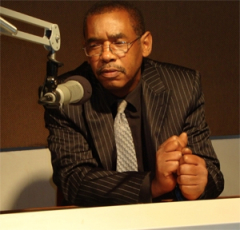Adrian Peterson’s Story Brings Back Painful Memories
When the story of Adrian Peterson being accused of abusing his four- year-old son first broke it brought back painful memories for me. Those of you who are regular readers may remember that when my father passed away a little over nine years ago, my column at the time was, “It’s Too Late To Say I’m Sorry.” A painful tale that included the fact that after the years of what I perceived to be abuse that I took from my father as a child I had basically cut off contact with him over the course of my life and had never found the will to truly forgive. So you know that child abuse is something that I feel strongly about.
I also feel for the pain of children who are trapped in physically abusive relationships, because it is a pain I remember all too well. Sadly in the weeks since this incident first surfaced, as I have unofficially surveyed my circle of associates, I would say that fully 70 percent or more still spoke strongly that they received beatings like that and were none the worse for it, or at best that if Peterson did cross a line, too much is being made of it.
I am 58 years old and I realized again recently the magnitude of the anger that resides in me. I cannot speak for a community, but I think that some of the anger in our community comes from memories of being helpless and hurting as a child, and at least in my case swearing to yourself you will never let anyone hurt you like that again. And in my lifetime I have always had a quick and deep temper, and I have always been quick to aggressively attack anything or anyone that I even thought was trying to hurt me, even though in some cases no hurt was intended.
I think that growing up with abuse makes it hard to learn to express normal emotions. I think especially for young people who do not get help, there is a feeling that the world is doing this to you, or allowing it to happen, so obviously no one cares about you or what is happening to you.
There was an Irish folk rock singer in the ’80s, (Sinead O’Connor) who at one point was one of the darlings of the music industry, until one day in an interview on child abuse she uttered the phrase, “F**k the Pope” and her public turned on her. I remember seeing an interview with her on MTV in their early days where she just broke down in tears as she tried to explain why she had said what she said about the Pope. And essentially what she said is that she had talked to a priest about the abuse between her and her father, and that instead of the priest helping her, he told her father who then became even more abusive. She said she hated that priest because he was her last hope and that when he sold her out to her father, too, she just lost it and she expressed that so many years later by burning the picture of the Pope in her video. You could tell how real her pain was just looking at the tv, and as I watched I felt her pain, I cried her tears. Her career never really recovered, but I was glad to come across an article on her recently where she said that she had found peace.
I have a degree in Industrial Engineering from the University of Wisconsin and a more than 30 year federal career, so I am not trying to be some punk. But in school I was required to take a lot of coursework in organizational behavior and behavior modification. The founding principle of behavioral modification is operant learning theory. Under operant learning theory the discipline model is stimulus-organism-response. What this means is that we as an organism respond to a stimulus, be it positive or negative. Psychologists have spent decades trying to determine the difference in the impact of using positive versus negative reinforcement for stimulus. The widely held belief is that while negative reinforcement such as beatings or shouting at people may change the targeted behavior it can also yield other unpredicted and frequently negative responses that may be difficult to control. So by this theory tearing my a** up and Peterson did his son might make me stop doing the one thing you are tearing me up for, but it will also lead to other belligerent behaviors that can neither be predicted or controlled.
In the opposite extreme positive reinforcement appears to redirect negative behaviors without creating the unpredicted and uncontrollable consequences. This is the science that is used in setting up workforce discipline systems and it needs to become more a part of our community as well.
I have two children myself now and have rarely used corporal punishment on either. I won’t say one should never use it but in my experience and in the conversations I have had on the subject over the years I have come to some conclusions on how I feel about its use. I think corporal punishment, if used at all, should be the nuclear weapon in our discipline toolbox, and just like I would not launch a nuclear weapon in response to a terrorist bombing I am not going to tear my child’s a** up for a minor offense, or in my case for any reason. But from listening to others I have found that for those who only got a whipping a few times in their lives, it wasn’t that big of a deal, but for those for whom whippings were a regular and ongoing part of their youth there seems to be more lasting results. Children need discipline. Whipping is frequently not really about discipline it is about anger and punishment. We are fully grown adults, and in Peterson’s case he was dealing with a 4-year-old child. You cannot tell me that there are not better ways to discipline a 4-year-old child than to strip him naked and beat him until he has cuts and bruises across his body including on his privates. You cannot tell me that after being counseled by police for doing this to another child that Peterson had no clue that maybe he was wrong. I know that many of us endured this type of punishment when we were youths, it was wrong then and it wrong now, or at least that’s the way I see it.
(Do you have a question or comment on this column? Look me up on Facebook/HollisWormsby or email me at hjwormsby@aol.com.)




